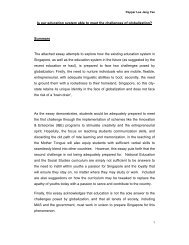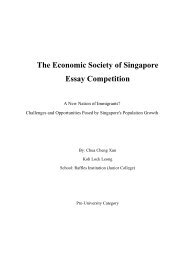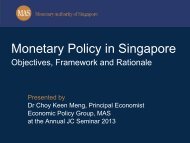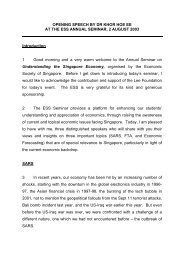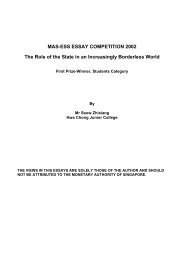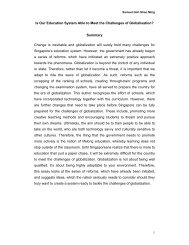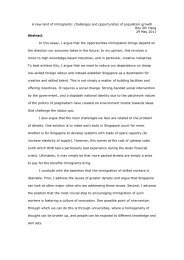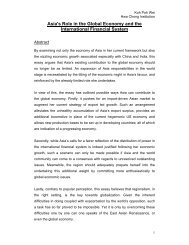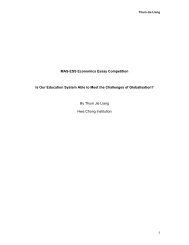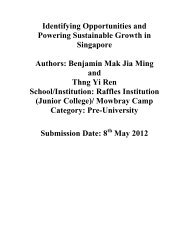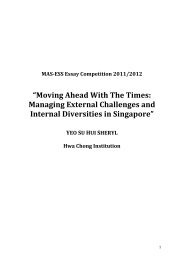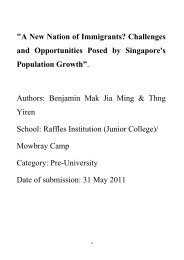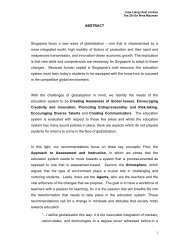the role of the state in an increasingly borderless world - Economic ...
the role of the state in an increasingly borderless world - Economic ...
the role of the state in an increasingly borderless world - Economic ...
- No tags were found...
You also want an ePaper? Increase the reach of your titles
YUMPU automatically turns print PDFs into web optimized ePapers that Google loves.
eneficiaries <strong>of</strong> globalisation will see <strong>the</strong>ir <strong>in</strong>comes rise dramatically. The widened <strong>in</strong>come gap<br />
requires government <strong>in</strong>tervention, <strong>in</strong> <strong>the</strong> form <strong>of</strong> a “help<strong>in</strong>g h<strong>an</strong>d”.<br />
ii. With <strong>the</strong> liberalisation <strong>of</strong> capital markets, <strong>the</strong> growth <strong>of</strong> <strong>the</strong> f<strong>in</strong><strong>an</strong>cial <strong>an</strong>d b<strong>an</strong>k<strong>in</strong>g sector<br />
tends to outpace <strong>the</strong> growth <strong>of</strong> <strong>the</strong> real economy, as seen <strong>in</strong> m<strong>an</strong>y develop<strong>in</strong>g economies.<br />
However, <strong>the</strong>re is <strong>of</strong>ten a lack <strong>of</strong> adequate safeguards to ensure good corporate govern<strong>an</strong>ce, as<br />
well as <strong>the</strong> political resolve to enforce <strong>the</strong> rules. The premature lift<strong>in</strong>g <strong>of</strong> capital controls has<br />
resulted <strong>in</strong> large short-term capital flows between nations. This may lead to <strong>in</strong>stability <strong>in</strong> a<br />
country should <strong>the</strong>re be a mass-migration <strong>of</strong> short-term funds out <strong>of</strong> <strong>the</strong> economy. Crises will<br />
ensue, as c<strong>an</strong> be seen from <strong>the</strong> experiences <strong>of</strong> <strong>the</strong> Asi<strong>an</strong> <strong>an</strong>d Lat<strong>in</strong> Americ<strong>an</strong> economies <strong>in</strong> <strong>the</strong><br />
n<strong>in</strong>eties.<br />
iii. The <strong>in</strong>creased mobility <strong>of</strong> both capital <strong>an</strong>d people <strong>in</strong> a global economy me<strong>an</strong>s countries<br />
must step up <strong>the</strong>ir efforts to attract <strong>an</strong>d reta<strong>in</strong> <strong>the</strong>m, result<strong>in</strong>g <strong>in</strong> greater <strong>in</strong>ternational competition<br />
for foreign direct <strong>in</strong>vestment (FDI) <strong>an</strong>d skilled labour. Migration policies among countries are<br />
sift<strong>in</strong>g towards barr<strong>in</strong>g <strong>the</strong> entry <strong>of</strong> unskilled labour while accept<strong>in</strong>g highly-skilled m<strong>an</strong>power.<br />
The ability <strong>an</strong>d temptation for talented <strong>in</strong>dividuals to migrate overseas will require <strong>state</strong>s to<br />
come up with policies that prevent a bra<strong>in</strong>-dra<strong>in</strong> <strong>in</strong> <strong>the</strong> workforce.<br />
iv. The IT revolution, rid<strong>in</strong>g on <strong>the</strong> back <strong>of</strong> globalisation, is tr<strong>an</strong>sform<strong>in</strong>g <strong>the</strong> economies <strong>of</strong><br />
m<strong>an</strong>y developed <strong>an</strong>d develop<strong>in</strong>g countries, <strong>in</strong>clud<strong>in</strong>g those <strong>in</strong> East Asia. The new economy<br />
requires countries to atta<strong>in</strong> a high level <strong>of</strong> technology so as to tap <strong>the</strong> new markets that IT opens<br />
up. Countries must shift <strong>the</strong>ir emphasis from focus<strong>in</strong>g on capital accumulation to <strong>in</strong>creas<strong>in</strong>g<br />
<strong>the</strong>ir <strong>in</strong>vestments <strong>in</strong> research <strong>an</strong>d development (R&D), while equipp<strong>in</strong>g workers with <strong>the</strong><br />
necessary skills for such <strong>an</strong> economy. With <strong>the</strong> IT age, a new eng<strong>in</strong>e <strong>of</strong> growth,<br />
‘technopreneurs’, or technology entrepreneurs, has also risen <strong>in</strong>to prom<strong>in</strong>ence.<br />
v. Nation-<strong>state</strong>s realise that <strong>the</strong>y are no longer fully <strong>in</strong> control <strong>of</strong> <strong>the</strong>ir domestic market.<br />
Trade <strong>an</strong>d <strong>in</strong>vestment l<strong>in</strong>kages expose countries to economic contagion. Globalisation has<br />
created greater <strong>in</strong>terdependence between countries, encourag<strong>in</strong>g governments to work<br />
toge<strong>the</strong>r, on both a regional <strong>an</strong>d a global level.<br />
Domestic Policy Implications<br />
Globalisation <strong>an</strong>d <strong>the</strong> new economic environment it creates require governments to review<br />
exist<strong>in</strong>g domestic policies on labour, science <strong>an</strong>d technology, citizenship, b<strong>an</strong>k<strong>in</strong>g, trade <strong>an</strong>d<br />
f<strong>in</strong><strong>an</strong>ce. The follow<strong>in</strong>g addresses <strong>the</strong> ch<strong>an</strong>ges that will have to be made <strong>in</strong> <strong>the</strong>se policy areas,<br />
with reference to East Asia <strong>an</strong>d <strong>the</strong> S<strong>in</strong>gapore economy, <strong>in</strong> greater detail.<br />
I) Improv<strong>in</strong>g Labour Mobility <strong>an</strong>d Productivity<br />
Unemployment that results from structural ch<strong>an</strong>ges <strong>in</strong> <strong>the</strong> economy is a key feature <strong>of</strong><br />
globalisation. Structural unemployment stems from workers not hav<strong>in</strong>g <strong>the</strong> required skills to<br />
undertake new jobs that are created by <strong>the</strong> knowledge-based economy. This is particularly so if<br />
workers are less educated, as <strong>the</strong>y will be less occupationally mobile. To tackle this, workers<br />
must be retra<strong>in</strong>ed to be able to cope with new technology <strong>an</strong>d mach<strong>in</strong>ery. Tra<strong>in</strong><strong>in</strong>g programmes<br />
<strong>an</strong>d facilities c<strong>an</strong> be provided, toge<strong>the</strong>r with government <strong>in</strong>centives for workers to retra<strong>in</strong>.<br />
Retra<strong>in</strong><strong>in</strong>g also serves as a useful measure to reduce wage <strong>in</strong>equity by clos<strong>in</strong>g <strong>the</strong> skills divide<br />
that separate <strong>the</strong> lower <strong>an</strong>d higher <strong>in</strong>come groups. In S<strong>in</strong>gapore, where 62.1% <strong>of</strong> <strong>the</strong> workforce<br />
has secondary education <strong>an</strong>d below 3 , this is covered by schemes such as <strong>the</strong> Skills<br />
Redevelopment Programme. The lack <strong>of</strong> job <strong>in</strong>sur<strong>an</strong>ce <strong>in</strong> most East Asi<strong>an</strong> economies tends to<br />
fur<strong>the</strong>r persuade workers to take up new skills.<br />
3 Annual M<strong>an</strong>power Statistics 2002, M<strong>in</strong>istry <strong>of</strong> M<strong>an</strong>power<br />
51



